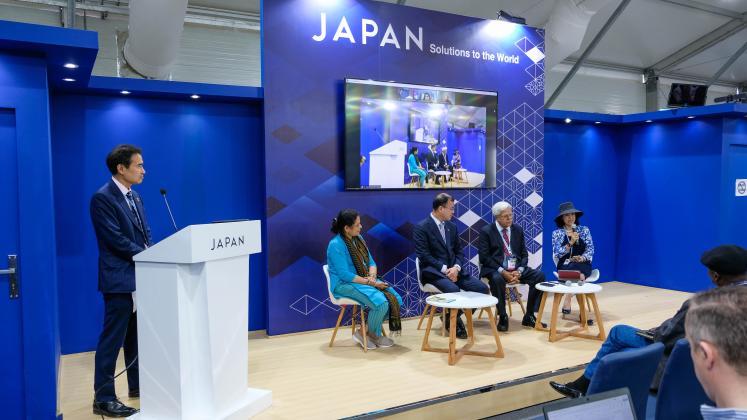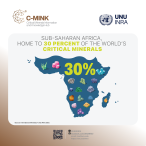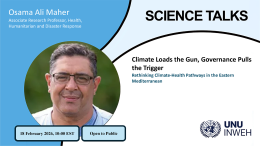On 10 November 2022, UNU-IAS hosted an event at the Japan Pavilion as part of the Sharm el-Sheikh Climate Change Conference (COP27). The event discussed actions to strengthen synergies between the Paris Agreement on Climate Change and the 2030 Agenda for Sustainable Development.
In welcoming remarks, Hiroshi Ono (Vice-Minister for Global Environmental Affairs, Japan) underlined the importance of advancing the outcomes of the Third Global Climate and SDGs Synergies Conference, which was held at UNU in July 2022. Stressing the need for youth empowerment, he highlighted the new UNU-IAS postgraduate degree specialisation on the Paris Agreement.
Shinobu Yume Yamaguchi (Director, UNU-IAS) presented an overview of the specialisation, noting that it would be the first of its kind to be offered by a UN organisation. She emphasised the commitment of UNU-IAS to achieving the SDGs and the Paris Agreement targets by empowering stakeholders through education and capacity-building programmes.
A scene-setting presentation was delivered by Akio Takemoto (Programme Head, UNU-IAS), who also moderated a panel discussion engaging UN agency and government representatives, as well as youth and academics who shared experiences and lessons learned on synergistic actions and youth empowerment.
Bahareh Seyedi (Senior Sustainable Development Officer, Division for Sustainable Development Goals, UNDESA) provided a summary of the key challenges and recommendations identified at the Third Global Climate and SDGs Synergy Conference. She highlighted the importance of advancing climate action and the SDGs agenda through intergovernmental processes at conferences such as COP27.
Discussing synergistic actions between climate and nature-based solutions (NbS), Sangmin Nam (Director, Environment and Development Division, ESCAP) emphasised that while the Asia–Pacific region was aiming for carbon neutrality, emissions were still expected. He pointed out that technical viability and increased finance for NbS would be key to achieving carbon neutrality, adding that demographic changes due to population ageing must be considered as NbS require a labour force.
Rajani Ranjan Rashmi (Distinguished Fellow, The Energy and Resources Institute) noted that while energy demand was growing, it was crucial to implement decentralised solar solutions to achieve India's 45% emission reduction target by 2030. He stressed the need to reduce the carbon footprint through sustainable production and consumption practices.
Noting that equitable and integrated policy approaches were key to addressing interrelated issues, Suneetha M. Subramanian (Research Fellow, UNU-IAS) referred to the One Health agenda as an example of the climate and biodiversity sectors working together to maximise synergies while minimising tradeoffs.
Craig Alec Native (Sustainable Systems Design + Research — Children and Young, Aarhus Municipality, Denmark) introduced Aarhus City's Youth Council initiative, an example of youth empowerment providing tools to integrate youth activism into lifestyle and awareness-raising.
Emphasising the need for meaningful youth engagement, Ayadi Mishra (Youth Representative, UN Decade Task Force) introduced participatory approaches from India, and noted that both bottom-up and top-down approaches were needed to bring youth, indigenous people, policymakers, and others together.
Yussuf' Tunji Kelani (Executive Director, Earth Advocacy) remarked that African countries were bringing young people together through agricultural initiatives to implement climate mitigation and adaptation strategies.
Discussion focused on job creation for just transition, education and empowerment (including inter-generational empowerment), global comprehensive resources, integration of sustainable development into school systems, and a whole-society approach.





